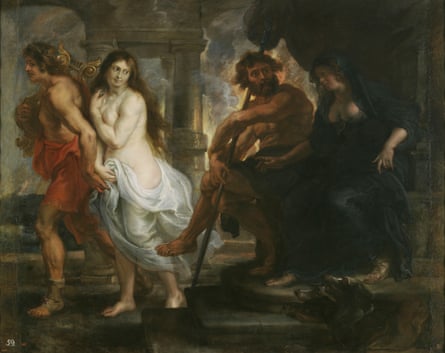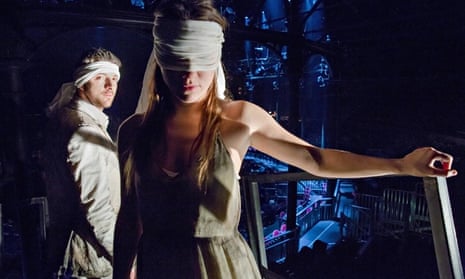L’Orfeo wasn’t quite the first opera, but the consensus seems to be that it was the first that was any good. Some still hold it to be the greatest. Monteverdi was smart enough to choose just about the best story we have; indeed it’s hard to imagine starting with any other. The tale of Orpheus is about many things, but principally it is a story of music and death – the meaning the former gives to our lives, and how it can assuage and even challenge the apparently meaningless whims of the latter. Music is the sound of articulated emotion; the sound of the sense humans make for a world without (for me, at least) intrinsic meaning, a meaninglessness that death incarnates. Orpheus is the renegade singer-songwriter par excellence: his musical prowess allows him to break the rules, again and again … Then he has to pay the price.
Much of the opera’s strength lies in the dissonance between the crude power of the myth Alessandro Striggio, Monteverdi’s librettist, tells – and the sometimes outrageous sophistication of the music itself. Striggio keeps fairly close to the canonical story. Orfeo loses his beloved new bride Euridice to a snake in the grass. Then he breaks the law. He goes down to Hades, armed with only his lyre, to retrieve her. He fails as he cannot keep to one silly rule – that he must not look back – and meaninglessness wins out again. King of the Underworld, Pluto, then appears to give in to his wife, Queen Proserpina, when she begs that the grief-stricken Orfeo be allowed to retrieve his beloved. But the game is rigged. Not only has Pluto set an arbitrary condition that states Orfeo cannot turn round to see if Euridice is following him, there’s also a strong suggestion that the noises off that trick Orfeo into doing so were well planned. The lesson? The rule of the law is more important than the substance of the law.
Orpheus’s final chapter sees the maenads – the female followers of Dionysus – tear him limb from limb, in revenge for his switch of allegiance from Dionysus to his father (or at least father-figure), Apollo. However, Striggio pursues a less well-known alternative ending. Mad with grief, Orfeo starts taking it out on womankind in general with a strange, disturbing march-like song, but he is saved from himself by Apollo, who chastises him for his excess of passion, then suggests that he join him upstairs, right now, to share eternal life in heaven. Since Orfeo had just declared his intention to spend the rest of his days on Earth howling of his injustice, you can’t help feeling that this mad inconvenience is being swiftly hushed up. The establishment hates a troublemaker. Anyone who plans to stand around yelling about the unjust laws on which society is founded will not last long: the status quo will be preserved. In contrast to the more familiar version, this story ends with a triumph of the male, patriarchal, Apollonian order.
When Michael Boyd asked me if I’d write a singable English version of L’Orfeo, the sensible answer was probably “No”, but there we go. I got hold of one of the very few other versions, by the poet Anne Ridler. I found it laughably affected: it was all “festive with flowers the meadows smile in springtime”. Two weeks later I was looking at it with a deepened respect. I had entirely failed to appreciate the difficulty of the task.
Michael had asked me to make a rhymed version as close to the original as possible. Sometimes I can confuse simple-sounding tasks with easy ones, much in the way “20 press-ups” always sounds like a breeze. The technical problems of making a singable version of an Italian opera can be stated very simply: you have to make English sentences fit music written for Italian ones. However, this is like trying to fit a set of spanners into a velvet box made for a dinner-service. It also means you have to flip the polarity of the whole language: English rises, and mostly goes duh DAH. Italian falls, and mostly goes DAH duh – and therefore so does any music written for it. Trying to preserve the rhymes introduces an additional twist. There are notoriously few decent rhymes in English (by contrast, it’s hard to avoid rhyming in Italian), but one way of making it even more of a challenge is to insist that every line-ending has to be strong-weak. This immediately reduces your options by about 80%, and it turns out you can’t just whack in participles at the end of the line. There are only so many times your nymphs can be singing and lamenting before those listening start praying that you’re going to be stopping. What you can do with a renaissance opera, though, is occasionally boot the language back 400 years, back to when you had a distinct poetic diction. Your chances of getting a decent rhyme are then significantly increased, since to place any old word at the end of the line you are freely released.

When I came to compare the original text with the score, it was immediately clear that Monteverdi did what almost every other composer does when presented with our beautifully sculpted, rhymed and metred verses: he ignored them whenever he felt like it. One can sense Striggio’s mute dismay when his best rhymes disappeared as a line-ending was ignored, or a rhythm was destroyed by the local exigencies of a melody, or his best line was garbled by polyphony – or dumped in the top of the soprano range, where God has seen fit to allow us precisely one vowel. But the librettist’s role is cooperation, not collaboration, and I imagine he learned this pretty quickly. And, of course, Monteverdi had his priorities exactly right – the music and the drama come first. But given that not one note could be changed, it wasn’t a matter of simply placing my little pumps carefully in the footsteps of Striggio’s formal dance, but the mad dance that resulted when Monteverdi shot at Striggio’s feet.
I found the only way was to make a clear English paraphrase of the broad sense, and then work directly on to the score. If you see anything that’s a crotchet or longer, that’s a content word; if you see a run of semiquavers, you can whack in grammatical function, all the but/of/if/a/on/what/you/to worker ants of English. Draw a slash at the end of every melodic phrase, and shoehorn in a strong-weak ending. If you see a high long note, make sure it’s a vowel that can actually be held by a human, not a wolf or an emu, and that an unimportant word isn’t being idiotically foregrounded, so no one finds themselves warbling “shoooooooes”. Get lucky with the rhymes. Make sure you have Christian Curnyn, conductor and baroque music genius, on hot-dial to check your homework. And learn quickly that it doesn’t matter how or where or for whom you set the word “paradise”, it will always sound bollocks. It was less like translation than trying to do a 200 x 200 sudoku where only three numbers had been written in. And don’t get me started on the recitative.
Is there any room for poetry under such circumstances? Yes, I think so. I made the language as Anglo-Saxon and plain as possible, so the poetry would be delegated not to the fine turn of phrase (for which there was little room anyway) but to the song of the vowels, to the inherent, primitive energy of the story itself – and to what Boyd additionally intends to make of it. But one of the features of such technical tasks is that because you’re so distracted in conscious procedure, the unconscious will make more decisions than it’s usually allowed to, and constantly erupt through the fabric of the line. Reading it back now, the whole thing is far stranger than it seemed at the time, something I hope will counterpoint the strangenesses in Monteverdi’s music, his startlingly modern harmony and eerie Mediterranean influences.
A few years ago I made a version of Rilke’s Sonnets to Orpheus. Rilke’s poem is not, as some commentators have wrongly claimed, “a sequence” in the usual sense; sequences require more planning. Rilke’s poems were wholly informed by the Orpheus myth, but they took the form of what he called an “enigmatic dictation” – 54 poems (one was added later) written, astonishingly, in about two weeks. It is a book that goes straight to the heart of what the Orpheus myth says about us. Music reconciles us to our paradoxical condition: we make the dumb mistake of thinking ourselves nouns, but we are really verbs. You might think you are a “thing” – and we certainly mourn each other’s shocking disappearance as if we were are real things, which aren’t supposed to just vanish. But look around the room: almost everything in it will survive you. We’re really ghosts – from early childhood, we have perfect knowledge of our own deaths – and we certainly must look like ghosts to the room, as we come and go. Song, in Rilke’s conception, passes across the gap between the two realms, the here-and-now of the living and the atemporal, eternal world of the dead – and in uniting them, makes sense of our own ghosthood. Orpheus incarnates this principle, and in many ways represents what is most us. So, alas, does his tragedy.

Comments (…)
Sign in or create your Guardian account to join the discussion